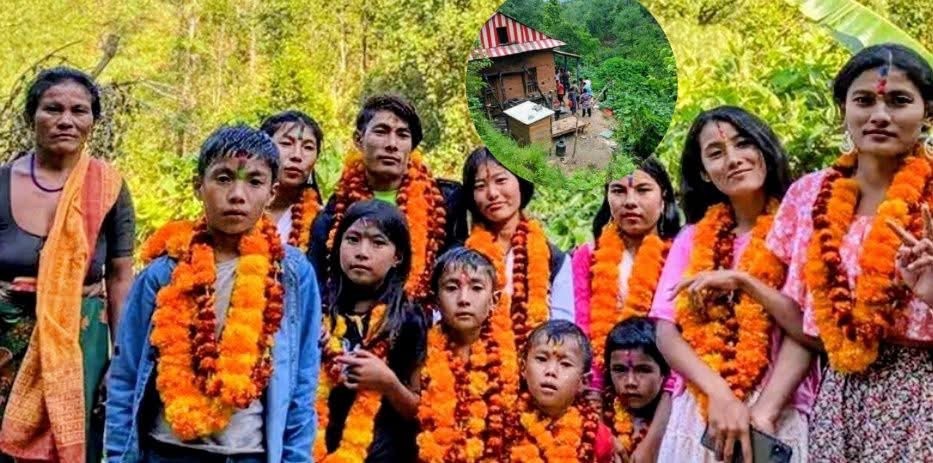- Sixteen members of the Hayu family went missing from a remote settlement in Sindhuli.
- They were later found safe in Pokhara and reunited with relatives under police oversight.
- The Hayus are part of the indigenous Kirant tribe and left in search of work, healthcare, and dignity.
A Mysterious Disappearance from Sindhuli
Police have launched an official investigation after 16 members of the same family were reported missing from Golanjor Rural Municipality in Sindhuli district. The family, led by Urmila Hayu, lived in a remote area called Bhandas Bippar Kateri, located near Chetpa in Ward-6 of the municipality.

Hayu family home in Bhandas Bippar Kateri, Sindhuli — image via social media
On Monday morning, local residents discovered the house abandoned and informed Sindhuli District Police. Officers arriving at the scene found livestock—chickens, goats, and buffaloes—left behind. Minor disturbances were observed inside the home, but no signs of struggle.
“They may have gone missing since Saturday night or Sunday morning,” said Shankar Raj Baral, Chair of Golanjor Rural Municipality. “The house is quite isolated, and there are no neighbors nearby, so no verified information could be obtained immediately. An inspector from the Khurkot police post has already been dispatched.”
Tracing the Trail to Pokhara
As news spread across districts, police teams in Sindhuli, Ramechhap, and Kaski coordinated a search operation. A breakthrough came when a van driver, Navin BK, informed police he had transported the family from Baleni, Sindhuli, to Pokhara. The van, marked Madhesh Province 04-001 J 0081, left around 1:00 AM and traveled via Khaniyakharka, Hetauda, and Muglin.
According to the driver, he dropped them at a Lakeside hotel. Hotel staff later confirmed that the group rented three rooms for one night and left on Sunday morning without a trace.
Safe But Unsettled in Gagangaunda
By Monday night, police located the missing family in Gagangaunda, Ward No. 30 of Pokhara. Four individuals were found at the home of Chandra Bhandari and the remaining twelve at the home of Somnath Paudel.
They told authorities they had no intention of returning to Sindhuli, citing unbearable living conditions.
Handover and Police Oversight
According to a report by Online Khabar, police formally handed over the family to two relatives—Dhan Bahadur and Amis Tamang—in the presence of local officials including Ward Chairperson Durgaprasad Subedi.
While 16 were initially reported missing, a total of 19 people were found in Pokhara. All were either close relatives or part of the extended Hayu household.
The family’s middle daughter, Sujata, who lives in Kathmandu, expressed shock. “I didn’t even know the entire family had left,” she told investigators.
Living on the Edge
The Hayu belong to the indigenous Kirant tribe, speak their own language, and follow animist religious practices. The government provides a monthly allowance of NPR 4,000 per person to members of the Hayu community. Before leaving, the family had received a three-month advance totaling NPR 180,000. With that, they quietly exited their village.
The family told police they were seeking labor opportunities and better living conditions in Pokhara.
This story isn’t just about a missing family—it reflects the hidden migrations of many rural households burdened by poverty, illness, and isolation. The Hayus didn’t disappear to escape wrongdoing. They left to preserve dignity, to protect health, to start again.
SP Shyam Babu Oliya of Kaski Police added, “They were calm. But their eyes showed what they’d been through. They were tired—but not defeated.”
The Larger Reality
The disappearance and rediscovery of the Hayu family is just one thread in a growing fabric of quiet displacement across rural Nepal. In the absence of employment, healthcare, and basic infrastructure, entire families are quietly making moves—sometimes unnoticed, sometimes misunderstood.
While their journey made headlines, thousands more remain in the shadows, caught between the pull of survival and the weight of leaving home behind. What Urmila and her family chose was not rebellion—it was resilience.
Their story is a reminder that behind every silent departure is a loud message: people are not fleeing comfort—they are chasing the chance to live with dignity.
This story is based on the report by Online Khabar and additional reporting from NepalNews.com.
Follow Virginia Times for regular news updates. Stay informed with the latest headlines, breaking stories, and in-depth reporting from around the world.
A global media for the latest news, entertainment, music fashion, and more.














